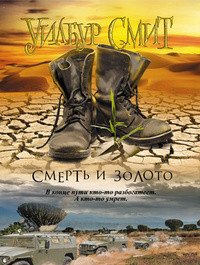Men of Men - Smith Wilbur (книги бесплатно без txt) 📗
In the gloaming a leopard sawed and hacked harshly from the dense dark riverine forest nearby. Cathy shivered and stood up. She cast one last lingering glance across the wide river bed and then at last she turned for home.
Bazo could not sleep; hours ago he had left his sleeping-mat and come to squat by the fire in the centre of the hut. The others had not even stirred when he moved, Zama and Kamuza and Mondane, those who would accompany him tomorrow.
Their finery was piled beside their recumbent figures.
The cloaks of feathers and furs and beads, the headdresses and kilts, the regalia reserved for only the most grave and momentous occasions, like the Festival of the First Fruits, or a personal report to the king, or, again, the ceremony for which they had gathered and which would start at the dawn of the morrow.
Bazo looked at them now, and his chest felt congested with his joy, joy so intense that it sang in his ears and fizzed in his blood. joy even more intense in that these his companions of the years, with whom he had shared boyhood and youth and now manhood, would be there again at one of the most important days of his life.
Now Bazo sat alone at the fire while his companions snored and muttered in sleep, and he took each coin of his good fortune and, like a miser counting his treasure, fondled it with his mind, turning each memory over and gloating upon it.
He lived again every moment of his triumph when the lines of captive women had filed before Lobengula and piled the spoils in front of his wagon, the bars and coils of red copper, the axe heads, the leather bags of salt, the clay pots full of beads, for Pemba had been a famous wizard and had gathered his tribute from a host of fearful clients.
Lobengula had smiled when he saw his treasure, for that was what had been at the root of his feud with Pemba. The king was not above the jealousies of common men. When Lobengula smiled, all his indunas smiled in sympathy and made those little clucking sounds of approval.
Bazo remembered how the king had called him forward, and smiled again when Bazo emptied the bag he carried over his shoulder, and the wizard's head, which by then was in an advanced state of decomposition, had rolled to the forewheel of the wagon and grinned up at Lobengula with ruined lips drawn back from uneven teeth stained by the hemp pipe.
A troop of the gaunt, mange-ridden pariah dogs that skulked about the king's kraal had come to snarl and abble over the morsel, and when one of the blacksqu cloaked executioners would have scattered them with blows of his knobkerrie, the king restrained him.
"The poor beasts are hungry, let them be." And he turned back to Bazo. "Tell me how it was done."
Bazo relived in his mind every word with which he had described the expedition, and while he told it he had begun to giya, to dance and sing the ode to Pemba which he had composed: "Like a mole in the earth's gut Bazo found the secret way He sang, and in the front row of the senior indunas, Gandang, his father, sat grave and proud.
"Like the blind catfish that live in the caves of Sinoia Bazo swam through darkness.
Then as the verses of the song mentioned them, Zama and his warriors sprang forward to whirl and dance at his side.
"Like the black mamba from under a stone Zama milked death from his silver fang When the triumph dance was over, they threw themselves face down on the earth in front of the wagon.
"Bazo, son of Gandang, go out and choose two hundred head from the royal herds," said Lobengula.
"Bayete!" shouted Bazo, still panting from the dance.
"Bazo, son of Gandang, you who commanded fifty so skilfully, now I give you one thousand to command."
"Nkosi! Lord!"
"You will command the levy of young men waiting now at the royal kraal on the Shangani river. I give you the insignia for your new regiment. Your shields will be red, your kilts the tails of the genet cat, your plumes the wing feathers of the marabou stork, and your headband the fur of the burrowing roole," Lobengula intoned, and then paused. "The name of your regiment will be Izimv-ukuzane Ezembintaba, the moles that burrow under a mountain."
"Nkosi kakhula! Great King!" Bazo roared.
"Now Bazo, rise up and go into the women to choose yourself a wife. Be sure that she is virtuous and fruitful, and let her first duty be to set the headring of the induna on your brow., "Indh1ovu!
Ngi ya bonga! Great Elephant, I praise you!"
Sitting his solitary watch by the fire, Bazo remembered every word, every change of tone, every pause and emphasis that the king had used to heap his honours upon him. He sighed with contentment and placed another log upon the fire, carefully so as not to wake his companions, and the sparks floated up through the opening in the highest point of the domed roof.
Then a distant sound interrupted his reverie; it was the single whoop of a hyena, not an unusual sound except that it was the first time that he had heard it since nightfall. On every other night the hideous cries of these loathsome animals began when they crept from their burrows at dusk and continued until sunrise.
They haunted the small woody copse beyond the cattle enclosure that all the inhabitants of Gandang's kraal used as a communal open-air latrine. The hyena cleansed the area of excrement during the hours of darkness. For this reason, Gandang's people tolerated the presence of an animal that they usually abhorred with a superstitious dread.
So tonight the single whooping cry at midnight drew attention to the silence that had preceded it. Bazo listened a few seconds longer and then let his thoughts stray to the morrow.
After the king, Gandang was one of the three most important personages in Matabeleland, only Somabula and Babiaan were his peers, so that a marriage at his kraal would have been a momentous event even if it were not his eldest son, himself a newly appointed induna of one thousand, who was to be the bridegroom.
Juba, senior wife of Gandang, and mother of Bazo the bridegroom, had supervised the brew of beer, watching with an expert eye for the bloom of yeast on the germinating sorghum, testing with her own plump finger the temperature of the ground meal gruel as it was malted, udging the addition of the final booster of yeast and then standing over the matrons as they strained the brewing through woven bamboo sieves into the huge black clay beer-pots. Now there were a thousand pots each holding half a gallon of her famous brew, ready to greet the guests as they arrived at Gandang's kraal. There would be a thousand invited guests.
Lobengula and his retinue were already on the road; they were sleeping tonight at the regimental kraal of the Intemba regiment, only five miles distant, and they would arrive before noon.
Somabula was with the king, while Babiaan was coming in from his kraal in the east with a hundred warriors in his bodyguard. Nomusa and Hlopi were coming from the mission station at Khami as Juba's special guests, and they were bringing all their daughters with them.
and Gandang had picked fifty fat bullocks from his herds, the bridegroom and his young companions would begin to slaughter and butcher them in the dawn, while the unmarried girls took the bride down to the river pool, bathed her and then anointed her with fat and clay until she glistened in the early sunlight. Then they would deck her with wild flowers.
The hyena called again much closer this time, sounding as if it were right outside the stockade, and then a strange thing happened. The single cry was answered by a chorus, as though a great multitude of the huge shaggy spotted dog-like beasts had surrounded Gandang's kraal.
Bazo started up from the fire in astonishment. He had never heard anything to equal this, there must be a hundred or more of the ungainly animals out there. He could imagine them, their high shoulders sloping down to meagre hindquarters, the flat snakelike heads held low as though the weight of massive underslung jaw and yellow carnassial teeth was too heavy for the neck.




